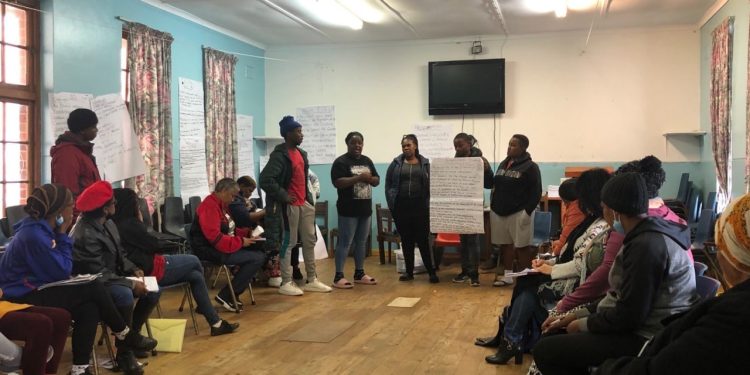SOUTH AFRICA – Kurdistan Youth Diplomacy Committee (Komîteya Diplomasi ya Ciwanên Kurdistan) started a one-month delegation journey to South Africa. Members of the delegation will travel to different cities, visit democratic organizations and discuss with them the history of South Africa’s struggle, and introduce the philosophy of Rêber APO and the Rojava Revolution. At the beginning of the journey, organizations will be visited in Cape Town and the Committee will participate in the events held there to promote the Kurdish Freedom Movement.
The Committee sent us a report about an Assembly on Cape Town, it can be read as it follows:
“Grassroots Organizing in Cape Town: The Housing Assembly
On the third day of the South Africa delegation, the Diplomacy Comitee of the Youth of Kurdistan was invited to the general meeting of the Housing Assembly.
The Housing Assembly was established in Cape Town in 2008 after living conditions, especially for the city’s black population, continued to deteriorate. In addition to the lack of basic services such as water and electricity, it was the evictions and forced relocations by the government that pushed the population to organize. Instead of creating housing where families have lived for generations, the government tries to relocate them to other areas, destroying naturally grown communities, often by force.
It quickly became clear that the state has no real interest in improving living conditions, but on the contrary is the source of many problems that affect the life and coexistence of society. That is why the Housing Assembly, which is now organized in 7 districts of Cape Town, today not only fights for better housing conditions, but also takes care of all areas of life in order to gradually create a social alternative to state services. In the long term, the aim is to politicize society not only against the South African government, but against the capitalist system itself.
This struggle strongly reminded the Kurdish delegation of the revolution in Rojava, where society has already been self-governing for 10 years and organizing itself at all levels of daily life, independent of the Syrian central government. These similarities in struggles provided much opportunity for lively discussion and exchange with the South African comrades, whose meeting also had strong structural similarities to communal organizing in Rojava.

After welcoming the roughly 40 delegates from the various districts, there were extensive discussions about what organizing means in the first place and to what extent the Housing Assembly has lived up to this claim in the past. Especially collective thinking and acting, openness and reflection, as well as initiative and the understanding of leadership were discussed lively. It was reiterated that the Housing Assembly is an alternative to political parties and therefore must reject any resemblance to them.
Afterwards, all districts reported on their respective situations, told about problems and the methods how they were tackled. The focus was on dealing with gang crime, youth work and violence against women.
Violence against women in particular was highlighted as a core issue of the work. In South Africa, one in four women will be a victim of rape in her lifetime, a high for a country that does not experience active war.
Within the meeting, not only acute measures such as self-help groups or the establishment of women’s shelters were discussed, but the patriarchal state system was identified as the source of violence against women. In order to combat this, seminars are to be held to sensitize young people in particular to this issue, so that the same behavior patterns are not passed on to the next generations. Especially the work with young people was given a lot of importance and it became clear that the organized young people themselves want to take the initiative for this.

Furthermore, methods aimed at attracting new members to the organization and improving the living conditions of the society were discussed. Self-sufficiency through the cultivation of vegetables was reported to counteract the severe poverty and the importance of door-to-door visits was emphasized to increase the visibility of the organization in the districts. It was emphasized that for the members of the Housing Assembly, the private is always linked to the political and thus they have to play an important role as interlocutors for their surroundings. At the end of the meeting, the motto was noted:
“When government fails, it is time for society to take charge.”
After the session concluded, the activist:s along with the Kurdish delegation not only continued to exchange ideas about the similarities and differences in their respective struggles, but also danced Kurdish and South African dances together. In an exuberant mood, the South African comrades expressed their solidarity with their fighting friends in Kurdistan and it was decided to deepen the contact between the two struggles in the future.”




